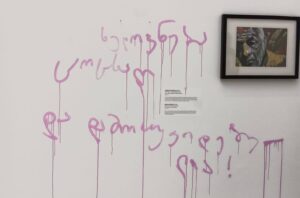Update:
The Ministry of Internal Affairs terminated the investigation into the criminal case against the artist Sandro Sulaberidze.
As mentioned in the statement issued by the MIA, there were no signs of crime, so the investigation was stopped.
Georgian authorities should immediately stop criminal persecution against artist – Sandro Sulaberidze. The criminal investigation of the peaceful performance by the artist shall be inadmissible. Artistic freedom of expression and performances play a vital role in a democratic and inclusive society, it can be only the subject of public debate, and discussion within cultural circles and civil society.

Sandro Sulaberidze, was a participant in the exhibition “Self-portrait by the Mirror” – an event organized at the premises of the National Gallery of Georgia, during the exhibition, he removed his own work and instead left the inscription on the wall – “Art is alive and independent”. As a result, the exhibition curator was summoned to the police and a criminal investigation was launched against the artist on the basis of theft. The event organizer fully restored the wall afterward. Therefore, the performance of the artist was a peaceful act, expressing an opinion, and did not cause damage or violate the rights or reputation of others to become the basis of a criminal investigation for theft. A number of artists participating in the event published a statement calling on to immediately stop persecution of the artist, as this is a violation of the artistic freedom of expression and performance was part of the artistic process.
Over the last few years, the Ministry of Culture is increasingly attacking the freedom of expression of artistic institutions and circles. Full-scale assaults against artistic freedom of expression, threatening Georgian film with a criminal investigation, appointing political nominees to various positions, constantly dismissing employees of national museums based on their political or other opinions, and refusing to allow journalists into art galleries are just some of the issues that arts and culture sector faces. It was an alarming censorship case when the documentary film by Salome Jashi was canceled and the Georgian Film academy banned the showing of the film about the country’s informal ruler.
Georgia has a number of international obligations to protect freedom of expression. Freedom of artistic expression is part of freedom of expression, protected by Article 10 of the European Convention on Human Rights. Moreover, the Council of Europe Manifesto on the Freedom of Expression of the Arts and Culture in the Digital age states that „ artists must be protected against censorship and any form of pressure or intimidation… Restrictions on freedom of expression and artistic freedom affect the whole of society, bereaving it of its pluralism and the vitality of the democratic process.“
Furthermore, Freedom of expression is guaranteed by the Georgian constitution and Georgia’s law on Freedom of Expression – which is a progressive legal act, unique in the region and fully in line with international standards, thus it should be properly implemented.
Therefore, we the undersigned organizations call on Georgian authorities:
To immediately stop the criminal investigation against the artist Sandro Sulaberidze, to ensure a safe and enabling environment for artistic creativity, and guarantee freedom of artistic expression in Georgia. This is important not only for individuals but generally for the democratic development of the country and society.
Signatory organizations:
Human Rights House Tbilisi
Human Rights House Foundation (Oslo, Norway)
Georgian Center for Psychosocial Rehabilitation of Torture Victims (GCRT)
Human Rights Center
Rights Georgia
Sapari
Racha Community Organization
Transparency International Georgia
PEN America
Artists at Risk Connection (ARC)
Media Development Foundation
Lawyer Friends
AISI Rehabilitation and Social Adaptation Center
GrlzWave
Human Rights Development Fund
Welfare and Development Center
Tbilisi Pride

